- More
- Back
Embarking on the task of selecting my favourite works by Agatha Christie – a writer whose plays, books and short stories have captivated me since my childhood – has been a journey filled with both nostalgia and admiration.
I still vividly recall the first time I visited her world, a world so intricately woven with mystery and suspense that it leaves an indelible mark on the reader.
Was it a challenge to whittle down her extensive output to a mere 10 books? Unquestionably so. Given the opportunity, I would eagerly list 20 titles and still feel the pang of leaving out several beloved works. Each book by Christie is a masterclass in storytelling, her craft so refined that choosing favourites seems a disservice to her genius.
Now, with the news that HarperCollins and a select group of authors will be expanding the universe of iconic characters like Marple and Poirot, we have another chance to revisit those familiar, yet always surprising, landscapes of crime and deduction. For a Christie aficionado, this is akin to rediscovering her genius in a new era, a prospect that is as thrilling as the twists in her own tales. Just as her works were a beacon of literary brilliance in my childhood, they promise to shine with renewed lustre in this bold, new endeavour.
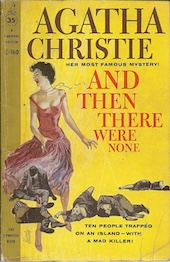 1. AND THEN THERE WERE NONE (1939)
1. AND THEN THERE WERE NONE (1939)
This is at number one because I honestly think it’s the best thing she ever did. There were rumours that Christie’s plot was influenced by other works at the time, not to mention her own book, The Murder of Roger Ackroyd.
Should we hold that against Christie? Of course not. Writers can get a spark of inspiration from anywhere… a film they’ve seen, a headline in the newspaper. How many love stories have been inspired or influenced by Romeo and Juliet? Even if it is a rewrite, it’s a damn good one!
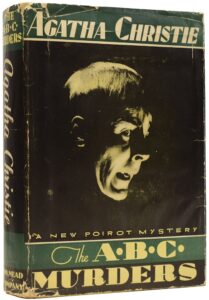
The David Suchet version on TV was excellent. It’s such a clever idea, and yet such a simple one, which is what Christie was always so good at. Going through the alphabet, with each murder corresponding to the next letter. This being Christie, things are not so simple: a little misdirection here and there, a (not so) obvious culprit, a clever bluff from Poirot.
TI first read this book when I was 16 or 17 and I was astounded by how good it was. Here we are, more than 60 years later, and it’s lost none of its power. Or its mystery!
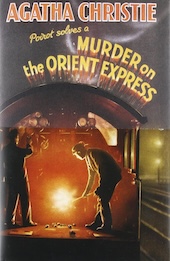
Because of the big screen adaptations – the 1974 version directed by Sidney Lumet and starring Albert Finney as Poirot was a huge success and picked up a whole heap of Oscar and BAFTA nominations – it has become Christie’s best-known work. I didn’t care for Finney as Poirot, though. A fine actor, but he didn’t feel like he was the right fit. After you’ve seen David Suchet, it’s hard to watch anyone else.
What I do love about this story is how she pulls these seemingly disparate and unconnected people together in this exotic, glamorous setting… classic Christie. As always, Poirot is the fly in their murderous ointment.
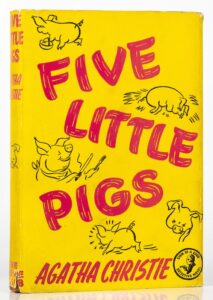
As someone who appreciates the intricacies of plot construction, I find this novel particularly intriguing for its unique structure and deep exploration of character. Christie deviates from the conventional whodunit pattern, instead presenting a historical crime through the recollections of five witnesses. The brilliance of Christie lies in her ability to maintain suspense, despite the readers knowing the crime’s outcome from the beginning.
Her characterization is masterful, with each of the five suspects – the ‘little pigs’ – uniquely fleshed out, their testimonies interwoven to create a tapestry of truth and deception. What we’re presented with is not just a puzzle to be solved; it’s a study of human nature, motives, and the fallibility of memory.
Christie’s genius shines in this novel, making it a standout in her illustrious career and a longstanding personal favourite of mine.
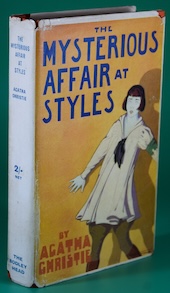
Almost impossible to believe this with Christie’s firs published novel and her first ‘detective’ novel and, as such, is the first time we meet this Belgian chap, Hercule Poirot – probably now the #1 detective in literary history. So many of the ingredients are here, a classic county house seeting, a murder hidden in plain sight, and she feeds in a nice twist by making Captain Hastings the narator.
There is a lot of crime writing out there. A lot of excellent books and a lot of average books. Every now and then, we hear about a best-seller who is supposed to be the new Agatha Christie. Let’s be perfectly honest here… there’s never been a ‘new Agatha Christie’ and I doubt if there ever will be.
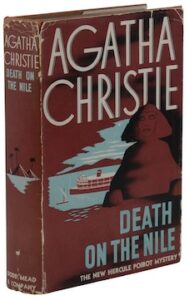
Christie takes us to Egypt, and wow, what a setting! It’s a love story gone wrong and chock-full of surprises. I love how she keeps us in the dark while allowing Poirot to sort out the mess. Although this has all the ingredients of a classic Christie adventure, it proves that they work just as well in the Sahara as they do in Stourton Heath.
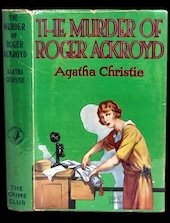
A book that blew my mind! Christie was so daring with this one and the ending really is something else – it turns the whole book upside down. It’s bold, it’s different and quite brilliant. For some people, it’s regarded as Christie’s masterpiece and it’s difficult to argue with them. It was a game-changer in crime fiction.
But here’s the problem. If I try and explain that breathtaking twist, I’ll end up giving the whole game away. If you’ve never read any Christie, this is the perfect place to make a start. You won’t be disappointed.
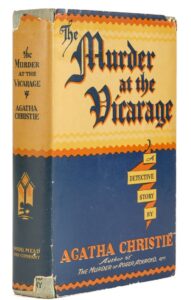 8. THE MURDER AT THE VICARAGE (1930)
8. THE MURDER AT THE VICARAGE (1930)Here we meet Miss Marple, and it turns out that she’s just as cool as Poirot. The story is set in a quaint English village, and – as you’d expect – it’s filled with gossip and secrets. Miss Marple is sharp and sees things others miss. Christie really nailed it with this character and the archetypal Arcadian setting.
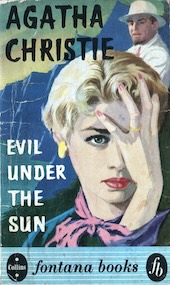
Evil Under the Sun is fantastic. Set in a holiday resort – the 1982 film with Peter Ustinov was filmed in Majorca, the 2001 TV version with David Suchet was filmed in South Devon – the story is overflowing with twists, turns and shady characters. Christie is an expert at keeping us off track, allowing Poirot, as usual, to figure it all out in his unique way. A reminder of how good she was at surprising her readers.
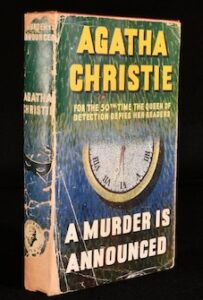
What a startling way to open a crime novel: a murder announced in the newspaper! The suspense in this book is top-notch. Miss Marple has to be at her best because every character and clue matters. It’s one of those Christie books that shows why she was absolutely unbeatable when it came to mystery writing.
For more articles, please visit the Unputdownable Article page, or the Unputdownable Podcast.
Or please read or listen to Chapter 1 of An Eye For An Eye for free.